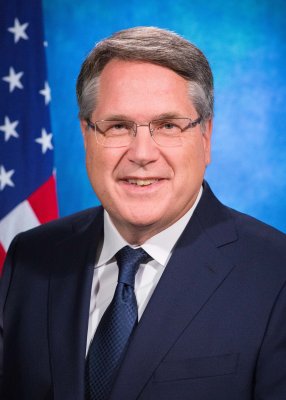Where are they now? David Reimer (’84), Director of West African Affairs
See also: Work comes full circle for David Reimer ’84, U.S. Ambassador
Reimer is a career member of the Senior Foreign Service and, on Dec. 13, 2017 was sworn in as U.S. Ambassador to the Republic of Mauritius and the Republic of Seychelles, two island nations in the Indian Ocean off the southeast coast of Africa.

1. What interested you in becoming a history major?
All my life I have been interested in history. Most of my reading growing up was biographies or books about historical events. I have always been interested in finding connections between the past and the present.
2. What was your history research topic? What made you select this topic?
My research topic was about George Kennan, containment policy and the Cold War. In addition to history, I have always been interested in international relations, so this was a good fit. At the time, tensions between the United States and Soviet Union were on the rise, so it was timely as well.
3. What have you done leading up to the work you do today?
After Goshen College, I went to grad school at the University of Pittsburgh, then went to work as an international affairs specialist at the U.S. Department of Agriculture. My job was to negotiative agricultural science and technology agreements between the United States and foreign governments. I also did a short stint on Capitol Hill, working for a U.S. Congressman. After five years in Washington, I joined the State Department as a Foreign Service Officer (diplomat) and have been there ever since.
4. In the work you do today, how does your history education influence into what you are doing today?
A history degree helps you put your work into perspective and teaches you to take the long view. As well, I learned to write from the history department at Goshen College, which turned out to be the most valuable and useful skill I picked up prior to joining the workforce.
5. What type of activities and conversations do you initiate as a diplomat?
We initiate a multitude of conversations, probably the most critical are with host government officials. Some are formal/official and some are more informal. The formal ones usually take place in Ministry offices or in Embassies and almost always there is a specific objective in mind, e.g. to find out what the Government of X thinks about Y. Or to convince the Government of X to take a certain action or to support the United States on a particular issue. The more informal conversations take place at dinners or receptions and those can be on any topic. In those conversations we are usually trying to establish a rapport or a connection, or sometimes it is purely social.
6. When visiting the West African countries, what cross-cultural skills do you need to use? How do you interact with a variety of cultures in your position?
When working in West Africa, or anywhere for that matter (I have worked all over the world) I think the most important skill is active listening. You learn more by listening than by talking. Asking informed, respectful, culturally appropriate questions is important.
As a diplomat, we have to be able to interact effectively in a variety of cultures at the same time. If we are overseas, we have to interact within the U.S. Embassy culture (which is a unique culture) with the foreign diplomatic community and within the host community. The culture of host country officials and foreign diplomats is completely different than that of the country you are working in. For instance, I would interact in a totally different manner if I was at an official dinner, hosted by the Foreign Ministry with guests from the diplomatic community, than if I were at say a wedding reception for a friend or co-worker from that culture. You have to tailor the style and substance of your interaction to each setting.
7. Did you know that you would work as a diplomat? Did you have other career goals in mind?
At some point, while at Goshen College, I realized that I wanted to work in international affairs. It did not need to be as a diplomat but I knew I wanted to travel and live and work in different cultures.
8. Any words of encouragement to fellow GC history undergrads?
It may take a little time but there are jobs out there for history graduates. Make sure you end up in a career where you are happy and feel a sense of value in your work.
(For those interested in pursuing an international career, Reimer recommends finding an internship or job in an international organization while still in school.)
It gives you a taste of the job, and you’ll also make connections,. Connections are still a very, very important part of job seeking experience. From an academic point of view, learn to think critically, learn to question and don’t be afraid to question, learn to communicate well, both written and orally. It’s really an important skill.
Learn more at careers.state.gov




